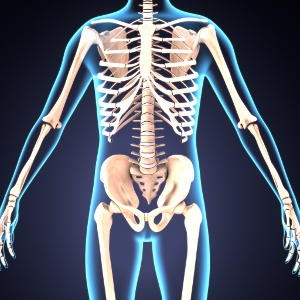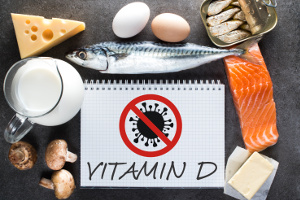Large population study: Lack of sun and vitamin D increases your risk of COVID-19 and new waves of the infection
 A large Israeli population study of over 4.6 million people shows that lack of sunshine and vitamin D increases the risk of COVID-19 infections and new infection waves in the winter period. The study shows why seniors, those with chronic disease, overweight individuals, and certain ethnic groups such as orthodox male Jews and female Muslims are more vulnerable. The scientists recommend vitamin D supplementation throughout the winter period or even all year round for those who do not get enough sun exposure during the summer. You can also read about why face masks block the body’s vitamin D synthesis, why COVID-19 originates from bats, and other mysteries related to the spread of the infection.
A large Israeli population study of over 4.6 million people shows that lack of sunshine and vitamin D increases the risk of COVID-19 infections and new infection waves in the winter period. The study shows why seniors, those with chronic disease, overweight individuals, and certain ethnic groups such as orthodox male Jews and female Muslims are more vulnerable. The scientists recommend vitamin D supplementation throughout the winter period or even all year round for those who do not get enough sun exposure during the summer. You can also read about why face masks block the body’s vitamin D synthesis, why COVID-19 originates from bats, and other mysteries related to the spread of the infection.
- Created on .









 The number of seniors in the world is growing steadily which means a surge in problems like cardiovascular disease, cancer, respiratory illnesses, overweight, diabetes, rheumatism, dementia, and Alzheimer’s disease. These diseases that have a widespread impact on human lives and are a burden to society are often linked to chronic inflammation. A group of scientists therefore decided to look closer at studies that have found a positive effect of the omega-3 fatty acids EPA and DHA on cognitive functioning, maintenance of muscle mass, and prevention and treatment of a host of serious diseases that are related to ageing. It is vital to start supplementing early and to take the right doses, according to the new review article published in Nutrients.
The number of seniors in the world is growing steadily which means a surge in problems like cardiovascular disease, cancer, respiratory illnesses, overweight, diabetes, rheumatism, dementia, and Alzheimer’s disease. These diseases that have a widespread impact on human lives and are a burden to society are often linked to chronic inflammation. A group of scientists therefore decided to look closer at studies that have found a positive effect of the omega-3 fatty acids EPA and DHA on cognitive functioning, maintenance of muscle mass, and prevention and treatment of a host of serious diseases that are related to ageing. It is vital to start supplementing early and to take the right doses, according to the new review article published in Nutrients. Periodontal is the leading global cause of tooth loss. It is a problem to prevent and to treat this condition because large population groups are neither able to nor used to taking proper care of their teeth and because it is expensive to see a dentist. A group of Australian scientists have decided to take a closer look at vitamin C’s role in dental health and determine how important it is to get enough vitamin C from the diet and from supplements. Another substance is important for preventing periodontal disease. You can read more about that in the article.
Periodontal is the leading global cause of tooth loss. It is a problem to prevent and to treat this condition because large population groups are neither able to nor used to taking proper care of their teeth and because it is expensive to see a dentist. A group of Australian scientists have decided to take a closer look at vitamin C’s role in dental health and determine how important it is to get enough vitamin C from the diet and from supplements. Another substance is important for preventing periodontal disease. You can read more about that in the article.
 An abundance of international science links widespread vitamin D deficiency to impaired immune defense, a problem that has contributed to new COVID-19 waves and tends to make the infections life-threatening. The British government has therefore decided to give free vitamin D supplements to 2.2 million seniors, nursing home residents, chronically ill, and other vulnerable people to help combat COVID-19. The whole purpose of this is to slow down the epidemic and put an end to the numerous shutdowns of society, according to an article in the Daily Mail.
An abundance of international science links widespread vitamin D deficiency to impaired immune defense, a problem that has contributed to new COVID-19 waves and tends to make the infections life-threatening. The British government has therefore decided to give free vitamin D supplements to 2.2 million seniors, nursing home residents, chronically ill, and other vulnerable people to help combat COVID-19. The whole purpose of this is to slow down the epidemic and put an end to the numerous shutdowns of society, according to an article in the Daily Mail.
 Around one billion people worldwide are believed to lack
Around one billion people worldwide are believed to lack  Health authorities worldwide recommend supplements of
Health authorities worldwide recommend supplements of  Older people can easily become deficient of vitamins and minerals, which can weaken their immune system and make them more prone to infections and prolonged periods with disease. On the other hand, older people who take a multivitamin and mineral supplement with zinc and large quantities of vitamin C experience fewer days with disease and have less severe symptoms, according to a placebo-controlled study from Oregon State University. But many multivitamin supplements do not contain enough vitamin D and it is very important for older people to get enough of this nutrient.
Older people can easily become deficient of vitamins and minerals, which can weaken their immune system and make them more prone to infections and prolonged periods with disease. On the other hand, older people who take a multivitamin and mineral supplement with zinc and large quantities of vitamin C experience fewer days with disease and have less severe symptoms, according to a placebo-controlled study from Oregon State University. But many multivitamin supplements do not contain enough vitamin D and it is very important for older people to get enough of this nutrient. A panel of physicians and professors collaborating with the Swiss Society for Nutrition (SSN) recently reviewed the scientific evidence on the role of micronutrients in supporting a well-functioning immune defense for optimal health with particular focus on viral infections related to COVID-19. They conclude that there is widespread lack of vitamin C, vitamin D, selenium, zinc, and omega-3 fatty acids, all of which are crucial nutrients for the immune system. These deficiencies contribute to new waves of COVID-19 and can cause the infections to become life-threatening. The panel calls for immediate action with relevant focus on diet and supplements.
A panel of physicians and professors collaborating with the Swiss Society for Nutrition (SSN) recently reviewed the scientific evidence on the role of micronutrients in supporting a well-functioning immune defense for optimal health with particular focus on viral infections related to COVID-19. They conclude that there is widespread lack of vitamin C, vitamin D, selenium, zinc, and omega-3 fatty acids, all of which are crucial nutrients for the immune system. These deficiencies contribute to new waves of COVID-19 and can cause the infections to become life-threatening. The panel calls for immediate action with relevant focus on diet and supplements. "After about one week of taking the Q10 supplement I could feel a huge difference," says 23-year old Alan Piccini, who has been suffering from extreme fatigue and muscle aches ever since he was a child.
"After about one week of taking the Q10 supplement I could feel a huge difference," says 23-year old Alan Piccini, who has been suffering from extreme fatigue and muscle aches ever since he was a child. “Taking capsules with co-enzyme Q10 has freed me of the severe side effects of my cholesterol lowering medicine,” Mrs Franken explains.
“Taking capsules with co-enzyme Q10 has freed me of the severe side effects of my cholesterol lowering medicine,” Mrs Franken explains.